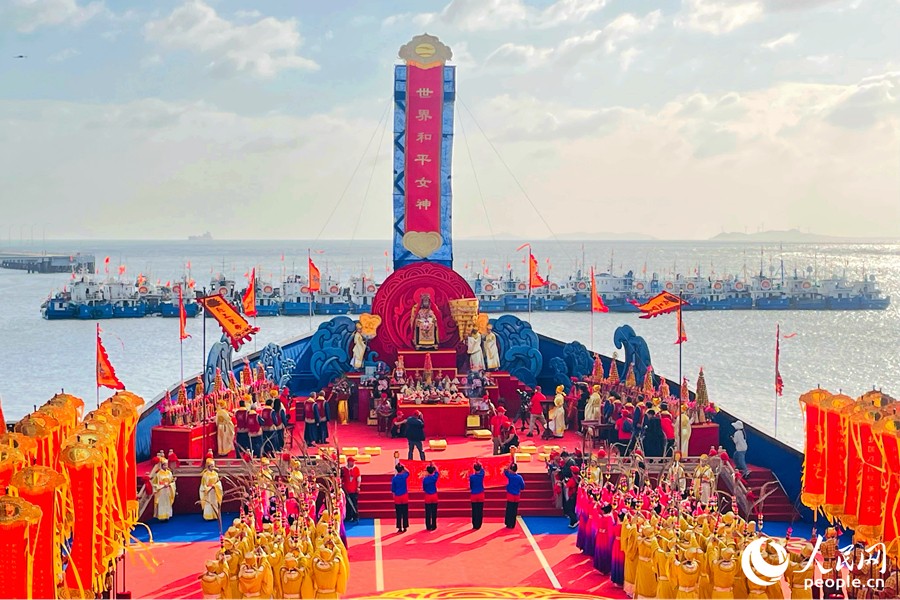




- BRNN
- BRI News
- BRNN News
- Database
Official Documents Polices and Regulations
Inter-government Documents International Cooperation BRI Countries
Business Guide Economic Data BRI Data
Trade
Investment Projects Latest projects
Cases - Content Pool

Photo shows an aerial view of a statue of the Chinese sea goddess Mazu on Meizhou Island, Putian, southeast China's Fujian Province. (Photo/Lin Chunsheng)
The Chinese sea goddess Mazu, a legendary sea deity originating from a small island in southeast China's Fujian Province, continues to captivate hearts around the world more than a thousand years after her birth.
In recent years, Mazu has become a social media sensation, with news of her traveling abroad with an "exclusive ID card" for cultural exchanges going viral, and her persona appearing in popular online culture, comics, and fan art communities.
Her influence extends across the Taiwan Strait. The annual Mazu pilgrimage in March is one of Taiwan's largest folk cultural events. This year, nearly 1,000 groups comprising 16,000 Taiwan residents traveled to Meizhou Island, the legendary birthplace of Mazu, to pay homage to the goddess at Mazu Temple.
Legend has it that Mazu was born in 960 and was renowned for her expertise in astronomy, swimming skills and medical knowledge, often helping fishermen navigate treacherous seas. She died at age 28 while saving others at sea.

Devotees from China and abroad pay homage to the Chinese sea goddess Mazu on Meizhou Island, Putian, southeast China's Fujian Province. (People's Daily Online/Lin Ying)
From the Song Dynasty (960-1279) to the Qing Dynasty (1644-1911), she was officially granted imperial honorific titles 36 times by different emperors. Her legacy, centered on virtue, benevolence, and universal love, continues to resonate with contemporary society.
It's believed that the enduring appeal of Mazu, who has more than 300 million followers globally, lies in her philanthropic historical deeds and the modern adaptability of her cultural representation.
Mazu culture has been consistently evolving in the modern era, opening a new chapter in international trade, meteorological science, and cross-cultural exchanges and dialogues.
The 10th Global Mazu Culture Forum recently highlighted themes such as Fujian-Taiwan cultural exchange, cultural heritage preservation and utilization, mangrove protection, digital inheritance and innovation, and green, high-quality island energy development.
Experts from around the world convened to exchange ideas across trade, culture, ecology, and technology, demonstrating Mazu culture's creative adaptation, innovative development, and contemporary relevance.

China's first marine wind and wave detection satellite is named Mazu, in honor of the Chinese sea goddess Mazu, at the 10th Global Mazu Culture Forum. (People's Daily Online/Lin Ying)
In the meantime, the forum has proven that Mazu culture is not only a rich source for research in history, humanities, social sciences, and communication, but its philosophy of harmonious coexistence with nature also provides a cultural foundation for contemporary technological fields such as ecological governance, green energy, and disaster early warning.
In recent years, a series of technological achievements named after Mazu have emerged in China, including the early warning initiative MAZU, the open-source "Mazu" series of marine forecasting models, and the country's first satellite designed to detect marine winds and waves, the Mazu satellite, scheduled for launch in 2027.
These projects exemplify the integration of cultural heritage with technological advancement, demonstrating Chinese wisdom and the country's sense of responsibility in global marine governance.
Mazu culture spans time and geography, from the voyages of the famous Chinese voyager Zheng He over 600 years ago to contemporary cultural exchanges under the Belt and Road Initiative.
Today, it continues to inspire approaches to ocean conservation, maritime safety, and cooperation on maritime security, as well as other global marine governance-related issues.

Tel:86-10-65363107, 86-10-65368220, 86-10-65363106